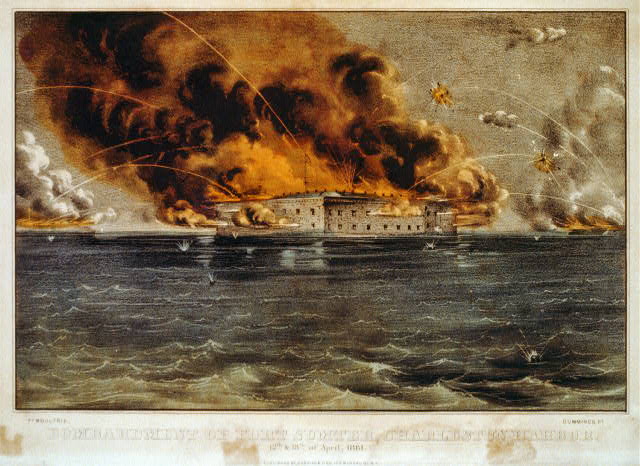
As we move into the 150 year anniversary of the U.S. Civil War, if we have any imagination at all, we're likely to find ourselves wondering -- how could so many people in a new nation thrusting with all its youthful energy toward material and physical modernity -- an oasis of freedom for many people from the Old World -- have included such a large fraction of the country so attached to the ancient practice of chattel slavery? How could so many have been so attached to holding other people as property, as goods to be bought, worked, bred and sold like cows or mules -- at the same time they prided themselves on being such a novel experiment in liberty? How could our not-so-far-removed ancestors have held these contradictions together?
On a recent Fresh Air interview program, historian Adam Goodheart provided this explanation:
Obviously (to us now) a deep certainty of white supremacy was central to the ease with which most took slavery for granted. And for most white citizens, the Civil War barely made a dent in their white supremacist assumptions, as Black people were restored to "neo-slavery" in subsequent decades.We tend to think of slavery also as just sort of simply a moral issue. But I think we think of it differently when we realize that the value of slave property, some $4 billion, enormous amount of money in 1861, represented actually more money than the value of all of the industry and all of the railroads in the entire United States combined. So for Southern planters to simply one day liberate all of that property would have been like asking people today to simply overnight give up their stock portfolios, give up their IRAs.
And again, it's terrible that people thought of their slave property this way. They thought of the amount that their slaves would be able to fetch on the market if they happen to fall on hard times. They thought of what those slaves would be worth as inheritance to their children, and how that slave property would have to be divided or liquidated with their estate.
Goodheart (author of the new Civil War history 1861) finds he has offer his students an analogy in order to help them make the imaginative leap to understand how slavery could ever have been considered the normal and proper status of other humans.
As it happens, I doubt our human species will find that responding to human-caused climate change is a matter of individual guilt and individual actions, like taking up bicycling (though moving around a bit more would do most of us good.) Rather, like the U.S. Civil War that ended legal slavery, finding a way forward is going to require an economic, social and moral transformation that most of us will experience as involuntary and wrenching, and for too many, deadly.... one example I use with my college students at Washington College when I'm teaching this history is to talk about today when many of us recognize that in burning fossil fuels we're doing something terrible for the planet, we're doing something terrible for future generations. And yet in order to give this up would mean sort of unraveling so much of the fabric of our daily lives, sacrificing so much, becoming these sort of radical eccentrics riding bicycles everywhere, that we continue somewhat guiltily to participate in the system. And that's something that I use as a comparison to slavery, that many Americans in the North, and even I believe sort of secretly in the South, felt a sense of guilt, felt a sense of shame, that knew that the slave system was wrong but were simply addicted to slavery and couldn't give it up.
In Hot: Living Through the Next Fifty Years on Earth, science journalist Mark Hertsgaard quotes Kris Ebi, an independent scientist who began analyzing global warming while working for the U.S. electric utility industry:
The U.S. is no longer a new, inventive, resilient nation; we've become a rather indolent and creaky old empire-on-the-wane these days. Our institutions respond poorly if at all to real human needs. But respond we will, because the future will be different from our past. We retain some choices about how inhumane adaptation will be; better to engage now than suffer later.The point we have to get across to people is that the future is not going to be like the past. It's human nature to assume it will be, but with climate change that's no longer true ...
Despite every other legitimate concern, we cannot ignore that our economic and social system is rapidly making the planet less habitable. So I will be posting "Warming Wednesdays" -- unpleasant reminders of an inconvenient truth.
You are such an optimist while being totally realistic about, well, reality. You impress me more with each passing year.
ReplyDelete